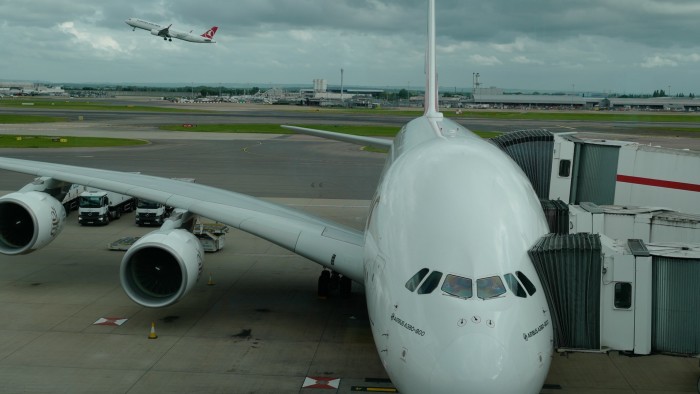Unlock the Editor’s Digest for free
Roula Khalaf, Editor of the FT, selects her favourite stories in this weekly newsletter.
The head of Emirates airline warned that Heathrow’s plans for a third runway could face a legal challenge if airlines were forced to pay higher landing fees in order to finance it.
The comments by Sir Tim Clark, whose airline is one of Heathrow’s most important clients, highlights growing concern in the industry over the potential costs of the project.
Clark told the Financial Times there was a “crying need” to increase capacity and he was “delighted” that expanding the UK’s only hub airport, which Dubai-based Emirates serves with a six-times daily A380 “superjumbo” service, was under discussion.
But he warned that the government and Heathrow’s owners must clarify how the project would be funded, and said incumbent airlines should not be forced to foot the bill through significantly higher landing charges.
“This could end up in legal challenges if you are not careful . . . we have to find an elegant means which satisfies all stakeholders,” said Clark, who has held senior roles at Emirates since the 1980s and has been president since 2003.
Heathrow is Emirates’ most popular international destination, with demand “quite extraordinary,” Clark said, adding that all the airline’s flights from the airport over the following 10 days were sold out, speaking on Thursday.
“I am delighted [Heathrow expansion] has come back into the mix . . . but what is the funding model?” he said.
The government has signalled its backing for a third runway, and Heathrow has said it will present a detailed proposal by the summer. Chief executive Thomas Woldbye has already said that the cost would be “significantly” more than the £14bn estimated in 2014, mainly due to inflation.
Heathrow anticipates that the expansion will be privately financed by shareholders, who will expect a return on their investment. The company said it “agrees with airlines” that the financial regulation needed to be changed before it could proceed with a full planning application.
Under the current regulatory model, Heathrow is allowed to recoup spending on airport improvements through the landing fees it charges airlines, which are typically passed on to customers through ticket prices.
The aim is to encourage investment in the airport, but airlines have long complained that Heathrow spends money inefficiently and that landing fees are too high. A years-long dispute ended last year with the regulator forcing Heathrow to trim landing fees.
Industry executives said the crucial debate was just how high those fees — currently about £25 per passenger on average — were allowed to rise, and whether the airport starts passing through the costs for the runway before it is finished.
“Say the cost is £20bn, and they are using a model that places on the incumbent airline community the costs of dong that . . . that’s going to be a pretty horrendous sell job [to airlines],” Clark said. “Some might not be in existence by the time it is finished.”
Some airline executives privately fear the overall price tag of Heathrow’s expansion — a multi-decade project that would also include rebuilding terminals, taxiways and road access to the airport — can eventually rise to as high as £60bn.
Airlines led by British owner IAG and Virgin Atlantic have launched a campaign to persuade the Civil Aviation Authority to review how Heathrow is funded.
American Airlines, the third largest airline at Heathrow, joined the “Heathrow Reimagined” campaign on Monday. “As a major operator at Heathrow representing substantial connectivity between the UK and the US, we support the objective … to implement a review, and wholesale reform of the existing and outdated regulatory model,” said Nate Gatten, chief government affairs officer of American Airlines.
Clark said a cheaper option to increase Heathrow capacity would be to loosen restrictions on night flights or flight paths over London, to allow more planes to land and take off on the airport’s two runways. But he conceded that this would be “a political bomb”.
“The great debate [over expansion] has been going on . . . since before I came to the business in 1972,” he said. “It is a real conundrum . . . somebody has to pick up this ball and run with it”.


